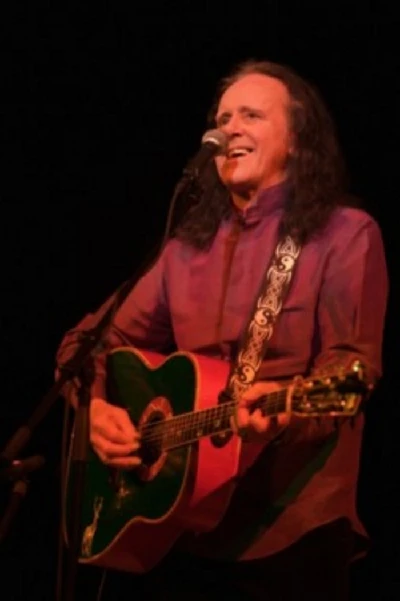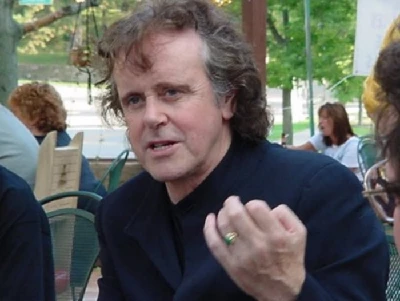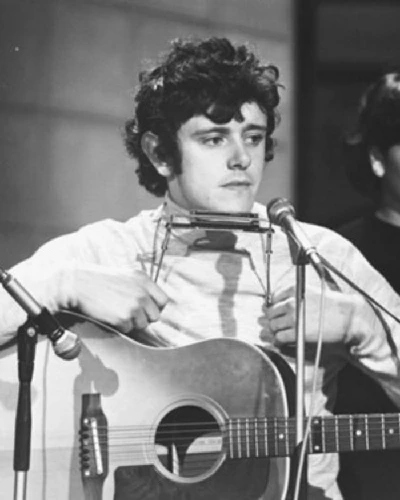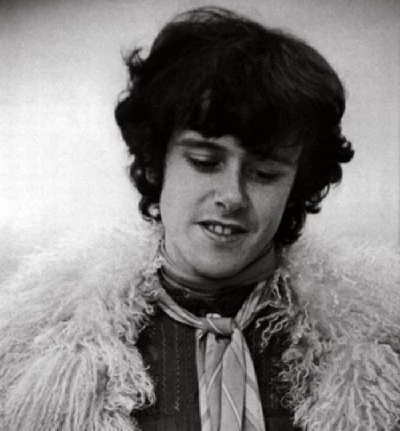published: 21 /
2 /
2011
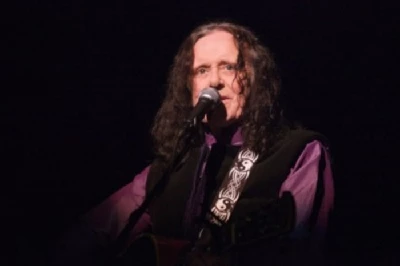
Lisa Torem speaks to 60's pop-folk legend Donovan about his latest album 'Ritual Groove', which was produced by film director David Lynch, his childhood musical influences and unique guitar style
Article
“Clouds are in love with the mountains/Trees are in love with the hills,” sings pop-folk legend Donovan on ‘Gentle Heart’ from his sparkling new CD ‘Ritual Groove’. Entering the world of this singularly-named poet requires an open, inquisitive mind. This Glasgow-born, magical musician now living in Ireland has been able to touch deeply into a wise, yet childlike place, to coin hundreds of whimsical epiphanies.
Another track from the new album, ‘I Am the Shaman’ might be even more telling. In many ways, if the era of the 1960s was indeed a cultural renaissance, Donovan certainly fits the description of healer. His discography was, and still is, almost like herbal medicine; gentle, curative and nourishing.
Donovan creates songs for those that have touched his life; he wrote, ‘Isle of Islay’ for the Maharishi, for example. Both he and filmmaker David Lynch found themselves enthralled, though at different time of their lives, with this spiritual leader. In 2009, Donovan, along with Paul McCartney, Ringo Starr and other luminaries, performed at New York’s Radio City Music Hall, at the Lynch-organized ‘Change Begins Within’ Concert.
The David Lynch Foundation For Consciousness-Based Education and World Peace (DLF) had already been established in 2005 to finance student scholarships for those who wished to learn the techniques of transcendental and to further research in the discipline, and both Donovan and Lynch, the director of films such as ‘Blue Velvet’ (1986), ‘Wild At Heart’ (1990), ‘Lost Highway’ (1997) and ‘Mulholland Drive’ (2001), recognized some powerful spiritual connectedness. Donovan subsequently enlisted Lynch to act as producer on ‘Ritual Groove’.
It was, by no means, Donovan’s first brush with a film director either. He had composed the score for Franco Zeffirelli’s, ‘Brother Sun, Sister Moon’ in the 1970s, which was about another spiritual master, St. Francis of Assisi. Donovan had already fallen in love with the director’s previous cinematic interpretation of ‘Romeo and Juliet’.
“Far across the harbour and ‘round the sandy cove/The shepherd with his pipe and sheep he drove” are lyrics from the illustrious and sweeping song ‘Starfish-on-the-Toast.’ and “Yellow is the colour of my true love’s hair/In the morning when we rise” on ‘Colours’ detail everyday emotions in a distinctive way. “To Susan on the West Coast waiting/From Andy in Vietnam fighting” is the lyric to one of his most peaceful, yet powerful anti-war sonnets, the single ‘To Susan on the West Coast Waiting’. To that category, we can add his rare cover of ‘The Universal Soldier.’
If you haven’t figured it out by now, I’m quite a fan, and before interviewing Donovan, was boldly challenged after hearing a teenager say, “I know Donovan. He wrote ‘Mellow Yellow’ - before our interview. “Only that one song,” I thought to myself, my mind spinning madly, fuelled by a desire to turn around young minds.
“What a piece of work is man?” asked William Shakespeare. That said, how many songs of an artist must we recognize before we enter his private world? Is there a finite number? In terms of Donovan, that journey must include, ‘Sunshine Superman’, ‘Barabajagal (Hot Love) and, without a doubt, a look at the uplifting, quirky tune that began: “I’m just mad about Saffron,” but to experience his dreamy tremolo, you must include ‘Lalena’ and to navigate innocent love, please embrace ‘Legend of a Girl Child Linda.’
The psychedelic, thrilling entrails of ‘Hurdy Gurdy Man’ can be enjoyed stoned or sober; that’s where the man’s voice quivers like an “electric banana” come to life. If you haven’t heard this one, you’ve got lots of homework to do.
But, may you experience my most earnest wrath, if you dain to chalk off this songwriter with merely one selection.
Here is the third verse in a poem by Robert Servant, entitled, “Words.”
Donovan’s father lulled him to sleep with many works by this particular poet.
“A fiddler lures fine tone from gut and wood,
A sculptor from stark stone shapes godlihood,
But let me just caress, like silver birds,
For their loveliness,
Bewitching words.”
Was this the mysterious poem which stimulated a young lad’s receptive mind, as he lay in a dimly lit bedroom before a golden slumber?
Let’s have Donovan take us further.
PB: Your most recent double CD, ‘Ritual Groove’, judging by the single, ‘I Am the Shaman’ suggests a return to a darker ‘Hurdy Gurdy Man’ timbre than the jazzier ‘Beat Café’ collection that preceded it. Was that because of David Lynch’s influence?
D: ‘I Am the Shaman’ is only one of the 27 tracks on ‘Ritual Groove’. Perhaps you have not heard the double album completely. Lots of light and some shade too. I am so pleased with how David Lynch produced me. I finally arrived in a David Lynch movie! The soundtrack, anyway!
PB: You have mentioned in previous interviews that you enjoy having filmmakers use your music. Yet, in several cases, songs you have written that evoked images of peace have been used in films that underscore violence; Martin Scorsese’s ‘Goodfellas’ and David Fincher’s ‘Zodiac’. How do you feel about this?
D: The use of ‘opposite mood’ music and even inter-cutting of scenes that are opposite mood is a well known film technique for highlighting the film-makers work, sometimes called ‘juxtaposition.’
When Martin requested ‘Atlantis’, I gave it to the master. No one can say Martin condones the violence he portrays in his films. David Lynch is also asked the same question you ask me. The artist often portrays life, but is not condoning the subject. The horrific painting ‘Guerin’ is not Picasso agreeing with the violence of the scene.
PB: When the Butthole Surfers covered ‘Hurdy Gurdy Man’ on a You Tube video they presented it as a real stoner piece. While it was fairly common for artists in the 60s to cite drug references in songs, do you feel that artists of your generation get a bit unfairly accused of rampantly writing about drugs because of the era in which those songs were written?
D: I’m not sure what accusations you mean. Songs have always been written and sung about magic plants, all through the ages, and up through Jazz, Blues and Popular Music, and it’s about time the word ‘Drugs’ should be understood to only mean alcohol , tobacco and the pharmaceuticals that killed Elvis and Michael Jackson; all sold legally .
PB: The other interesting thing is that people on the internet are actually decrypting the song for hidden messages. Do your songs harbour secrets?
D: Yes, of course, the songs of me and the Beatles and other pop-poets have secrets hidden in the songs. One can listen to the surface sound and have fun. When one listens in another way, the secrets are revealed. They are only hidden to your level of consciousness. It’s all about transcendental consciousness.
And often, the use of ‘double –entendre’ was a way of speaking to an audience about subjects banned by the society of the day.
PB: Your songwriting shows that you’re a big fan of alliteration; ‘Jennifer Juniper’, ‘Wear Your Love like Heaven’…
D: Oh, my goodness. You’re on to me. Essentially, you might not believe it, but it’s natural. I don’t notice it until I read over the lyrics later and there it is. It’s as if it’s a skill I must have learned; it’s very possible, from my father reading me so much poetry. It became natural to alliterate. But, where it comes from, I’ve got no idea. It seems so natural for it to happen and it surprises me.
PB: Your father read you poetry. Would you say that your upbringing greatly influenced your songwriting?
D: My father read me poetry of noble men and revolution. My family, on my mother’s side, there were seven sisters who sang the Irish tradition. Before the radio and the television took over the lives of people, people used to sing together. Radio was only turned on for a couple of hours a day and television was not owned by everybody. It was the 1940s and 50s and there’s a tradition in the Irish-Welsh background of poetry and song.
So, I was brought up – I didn’t know it – but I was brought up around poetry, music and story telling and so it was natural, really. Then I would seek out the beat poets and Woody Guthrie and Pete Seeger. Woody Guthrie and Pete Seeger, before I knew about Dylan, Woody Guthrie and Pete Seeger were the social poets and I had been brought up with my father reading me Robert Service and Robert Burns, who were actual poets, so he read me (Laughs) the mystical poets, Yeats, and the romantic poets, Shelley and Wordsworth and Keats, and so I had a good grounding in all those things, but you must remember I feel reincarnated, also.
How do I know this? I never went to school to learn poetry and music and yet I learned at 18 that I was part of the tradition of poetry and that I had work to do, and when I picked up the guitar I instantly knew how to play it like a lute or a harp, in the tradition of the Celtic tradition and so it must be from a previous life. It can’t be anywhere else.
So, that’s basically my background. I don’t know how old I am really. It must go back quite a few lifetimes. Maharishi, my guru, said that I was a very old soul.
(Donovan sings)
Old King Cole was a merry old soul and a merry old soul was he (Laughs).
(Continues to sing).
And they called us fiddlers three. (laughs some more).
D: But, it’s okay. You don’t have to be serious about these things.
PB: Donovan, I’d like to talk some more about ‘Wear Your Love Like Heaven’ which is one of my very favourite songs. Does it hold the same meaning for you now than when you originally composed it?
D: Basically, I am it. I don’t think that the era of the sixties is gone in anyway. There’s a perpetual presence.
Essentially, do I feel the same? Yeah, of course. ‘Wear Your Love Like Heaven’ is a phrase that a painter said to me in a pub once. William, gosh, what was his name? He was a lesser known American beat poet and a painter, as well, living in England, at the time, and for years, you know, his last name has escaped me, but when he said, Zen speaks of holding yourself in a certain position, not physically (Laughs), in an attitude to life and wearing your love like heaven is to always be in awe of a great sunset, in awe of what’s going on around you, and so it’s a childlike view, wear your love like heaven, and I still feel that. I can still feel a great amazement at the experiences of life, yes.
The news is on right now and Egypt is going absolutely mad, but they’re experiencing something that has been held back from them, and when I experience ‘Wear Your Love Like Heaven,’ I listen to it; I can feel the same thing that’s always been there, the perpetual feeling of great amazement at the planet we’re living on, but these guys in Egypt have been tortured and they’ve suffered so long, you know, they don’t know how to wear their love like heaven, yet.
PB: The Rock and Roll Hall of Fame Committee suggested that you “initiated the psychedelic revolution with ‘Sunshine Superman.’”
D: The Bohemian World explores Consciousness, the Transcendental Reality which lies within us all. The ‘Sunshine Superman’ album does look to have been the first to ‘initiate’ many into the transcendental lifestyle to come. Many of the songs speak of the journey into the Matrix that the paintings of Alex Grey portray.
The recording included sitar, harpsichord and conga rhythms. The Bohemian music world I came from included World Music and it was my mission to make a fusion of all cultural sounds and break the conventions of separating music styles and countries.
PB: ‘Season of the Witch’ allowed you to break out your electric guitar.
D: It was written on my acoustic.
PB: But did you intentionally set out to change musical direction when arranging these songs?
D: As these songs emerged from within me, I heard the sounds around the lyrics and told my producer Mickie Most. He realized I needed an arranger. John Cameron and I met and we three created the album.
And this year of 2011 is the year I will perform the complete ‘Sunshine Superman’album with sitar, harpsichord and full orchestra, conducted by the same John Cameron, at The Royal Albert Hall on June 3rd 2011.
PB: In your colourful autobiography, ‘Hurdy Gurdy Man’, you chronicle less than a decade of your life. What was the process for writing the book; how did you narrow down the events, and do you plan to write a continuation of your story?
D: I wrote up to 1996, but Marc Booth, chief editor at Random House, said, let’s do birth to 1970, not ‘War and Peace’! Marc edited a lot of stuff to follow the narrative. There is more to tell, I might just do it.
PB: Donovan, you taught the “claw hammer” style of guitar picking to John Lennon and Paul McCartney, which resulted in such songs as ‘Dear Prudence’ and ‘Blackbird.’ What is unique about this style and how did you pick it up? Did guitar playing come easy to you?
D: In the Bohemian World I came from the guitar styles were and still are paramount to learn. They are closely guarded and even books and videos today can’t really give the secret of how they are to be developed and become signature styles of the most loved guitar pickers. For instance, the signature style of the Rolling Stones sound was invented and developed by Brian Jones, the creator of the band.
The young Keith Richards learned much from Brian and his records, and now with Brian no longer with us, the Rolling Stones continue this sound as their brand groove. Their secret is in the tunings, and of course, Bill’s ‘No rush bass’ and Charlie’s Jazz style drums. The arcane guitar knowledge is passed on. I passed it on to John, Paul and George in India.
The unique Claw Hammer was invented by Ma Carter of The Carter Family, John Cash married into. May Carter developed it from the banjo picking of the time and transposed it to guitar.
John wanted to learn and Paul picked it up, too. George learned some chord progressions from the Jazz–Blues I knew and wrote, ‘While My Guitar Gently Weeps’. It was a return to the acoustic world for the three and I was touched by John’s ‘Julia’.
I came from a family who sang naturally for themselves the Irish and Scottish Folk Songs. And from my father I heard the poetry of noble thought and revolution.
PB: In an early interview from the mid 60s, you talked about the youth movement of the time and said, “They want things to look at that are lovely instead of ugly,” and “pop music is a perfect vehicle for the truth.” Did you feel a sense of responsibility to your fans at that time? Do you miss that era?
D: The era has not gone, it is un-folding The sixties was a Renaissance time of the rediscovery of repressed knowledge and denied music. Like in the 1500’s the established dogma and control was challenged as the powers in control fought to hold their position, only to be over thrown with the truth.
We are still experiencing the Renaissance of the 1500’s and now we are still experiencing the sixties as all the Bohemian Manifesto unfolds. The Manifesto is that there is knowledge available and that awareness can be awakened through meditation into the inner dimensions. Resulting in the birth of Transcendental Super Conscious Vision, which is the natural evolution of Higher Consciousness for Humankind.
This is the main tool for change which came from Bohemia into The Sixties. Also came with it, protest, civil rights activism, ecology, feminist rights, alternative energy sources, health food, and yoga and in short the complete instructions of how to save the planet from the foolishness of humankind.
I said the youth wish to experience beauty, and all that is.
“Fair to look upon and to touch
Oh Gosh, life is really too much.”
My exact lyric quote from my song ‘Oh Gosh’.
To contemplate beauty is to know truth
.
The ‘responsibility’ I felt was simply the service that poets have always performed in society, from the jungle to the city. We are the ones who can lead the tribe into personal catharsis and effect transformation of ones life by the skilful singing and the telling of archetypal tales. I have felt this since I began this time around. As if I carry on a tradition that I followed in a past life; maybe the Baric Tradition, in fact, of these Ancient Isles.
PB: ‘Atlantis’ was a legendary place which you immortalized in mostly narrative form. You refer to the Antediluvian Kings before the great flood; I believe most people would find it very hard to compare ‘Atlantis’ to any other song in pop culture. What inspired you to write this song and was there anything in your educational or spiritual background that you drew from?
D: The memory of a lost land over and under the waves is common to all nations. In Ireland it is Tir Na Nog. I read ‘Atlantis: the Antediluvian World’ by Ignatius Donnelly. The theory that there was an ancient civilization that brought knowledge to the world was in this book.
As I conjured the song, it evolved into a reading, and a great chant. I had also read Plato’s account that was supposedly preserved by Solon, a Greek who learned it from the Egyptian Priests.
The song became an anthem for youth, and now I see the hidden meaning is that there is a hidden knowledge under the turbulent emotional waves of surface life that we normally live. And that “Way down below the ocean of consciousness there lies a great secret to be revealed” , and as my song sings it is “Where I wanna be/She may be” Hail Atlantis!
PB: It is rare that you perform covers, but you recorded ‘Universal Soldier’ by Buffy Sainte Marie, the Native American singer-songwriter and political activist. What did that song mean to you during the Vietnam War and is it relevant now?
D: There are at least 300 videos on You Tube at present about this song. It reverberates today as war continues to be peddled like a trade in human suffering.
Buffy Sainte Marie brought this song to us to remind us that it means the same thing in Vietnam as it does now in Iraq and Afghanistan .
PB: In terms of production teams, you have worked with Andrew Oldham, and even after going in separate directions, you returned twice to work with Mickie Most. You have worked now as well with David Lynch. What went well and what was a challenge?
D: It all went well. In sessions, overproduction is the real danger. Mickie and I tried to repeat but it was not the same. The magic is in the timing and the times.
PB: In the 1960s you went to India with the Beatles, Mia and Prudence Farrow to study meditation with Maharishi Mahesh Yoga. To some, in the entourage, this experience was a passing fad. It proved to be quite meaningful for you, however.
D: We had read the books; we had sensed that meditation was really the way into the Fourth Dimension. The Beatles and I needed a Guru to learn the technique. We met Maharishi and studied in India. It is all true what we had read about, we dove deep inside. It looked like a fad to the press, as many changes came down. But Paul and Ringo meditate now and James McCartney and Dhani Harrison and my kids, also. It works and you should check it out at David Lynch Foundation on-line.
I meditate with Linda (Leitch, his wife-Ed) daily. It releases the tension of the nervous system, a deeper rest than sleep. Unseen healing goes on and you become clear and powerful as a human being. It’s the evolution of Super Consciousness that the Esoteric Books have spoken of for ages.
PB: What made you gravitate to transcendental meditation and can anybody learn it? What is happening in terms of working with the David Lynch Foundation? Why would inner-city kids benefit from this training?
D: Simply said, I met Maharishi and knew he was the direct link from the ancient pure meditation. It has been proven to de-stress any young student. He or she feels no fear of failure. Contacting the deeper part of us we find a great sense of calm and confidence. The upper layers of surface tension that society breeds through its grab for gain and short-term joy, we leave behind and experience Bliss and Energy that we can take into our lives and be fulfilled. This is the great power given to Students, especially in inner –city schools that are not working.
PB: Why do you think people are often resistant to transcendental meditation?
D: Well, it’s only called “TM” in this part of history. But, transcendental meditation is really what it says. It’s transcendental. I met Maharishi, as I said, and I realized that he was the direct link from a lineage that preserved the pure form, and it was passed on just like the esoteric guitar styles were passed on. There are many styles of meditation, but this was a pure form.
Now, meditation is not a cult or a religion; it’s the birth right of mankind, and it’s been known in all cultures, but it’s been preserved in the east, at a time when Christianity wiped it out for the populous and kept it for the priests, and so it’s now the property of everyone because of Maharishi coming down from the mountain and giving it to me and the Beatles and we gave it to the world.
So, we actually passed on a tradition, but we wouldn’t have found it unless we were looking for it, and so transcendental meditation has been proven to be the most effective and the most direct and the simplest form and has no connection to religion or cult, but many people think so because of their background. The Christian minds are very scared of it and so they should be, because it gives back to the individual freedom to discover the kingdom of heaven within; like Jesus said, the kingdom of heaven is within. But, when the churches of the west got hold of that message they said the kingdom of heaven is (Laughs) in another place, after you die, and that’s wrong.
The kingdom of heaven is not in a place after you die. The kingdom of heaven is with in everybody, like Jesus said, and like meditation takes you to.
PB: Donovan, poetry has been the bedrock of your compositions. Which poets have inspired you the most and how do you blend literary images with melodies and rhythms?
D: Yeats, Robert Burns, Homer (the other one!), Dylan Thomas, Cole Porter…and others; you ask how to make songs in high poetic order…I don’t write the songs…I create the circumstance for them to appear. I can teach this, also.
PB: If you could come back to life as any other type of being or animal, what would you choose and why?
D: None other than who I am.
PB: I hope you’ve been having a happy new year. What are your plans for 2011?
D: I received on February 7th a Lifetime Achievement Award at the BBC Folk Awards in London. My daughter, Astrella Celeste, in Los Angeles, has begun to record my songs for a project. We are in preparation also at the Donovan Office to tour the world in 2012 with ‘Ritual Groove’, the tour.
PB: Thank you.
Copyright Notice:
Donovan’s replies are exclusive to Pennyblackmusic Magazine. He has shared some of his forthcoming series, ‘Essays on the Sixties’, which will appear on his website, in this feature. More information about Donovan can be found at www.donovan.ie
Band Links:-
http://www.donovan.ie/en/
https://www.facebook.com/DonovanOffici
https://twitter.com/donovanofficial
Picture Gallery:-
